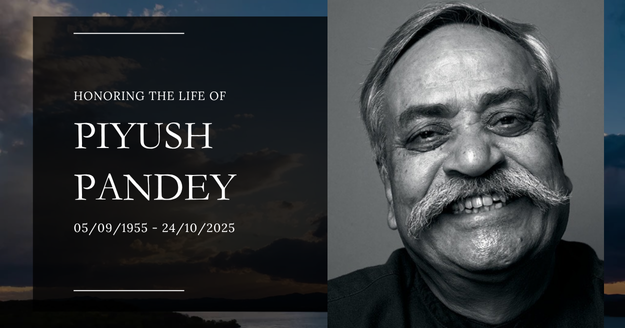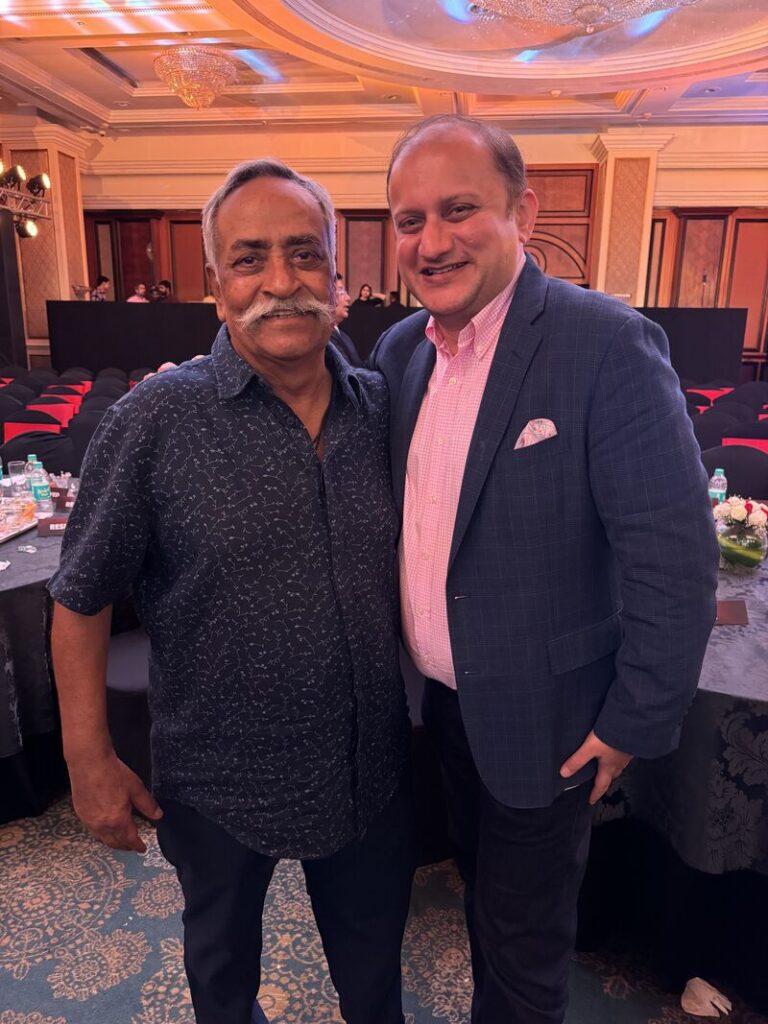
It was a heartbreaking Friday for the Indian advertising fraternity. The news of Piyush Pandey’s passing on October 24 left the entire industry in shock. It feels like an era has ended the kind that shaped India’s storytelling, identity, and creativity. From boardrooms to classrooms, from young copywriters to seasoned marketers, there’s a shared sense of emptiness—a void that words struggle to fill.
For Dr. Kushal Sanghvi, this loss is deeply personal. His connection with Mr. Piyush dates back to his college years, when he was a young student of advertising and marketing at HR College in Mumbai. Kushal says, “Those were the years when Piyush Pandey would come as a guest faculty,” he recalls. “He’d take us through case studies, projects, and immersive lectures, and that’s when I first met him. From being a mentor in my student years to staying in touch across decades, my relationship with him has been one of guidance, warmth, and inspiration.”
Over the years, that early bond grew into a lasting relationship. Though I never worked directly with him, I had the privilege of meeting him often on media projects, juries, and industry events in India and abroad. Each encounter reminded me of his humility. No matter how senior or celebrated he became, he treated everyone with the same respect and warmth. I’ve seen him speak to a peon in his office or a caretaker in his home with the same grace he showed to senior colleagues. That’s what truly defined him—his deep understanding of people and his innate humanity.
Beyond his brilliance as a creative mind, he was a remarkable human being. What always stood out to me was his deep connection with India’s heartland. His stories, his characters, and his expressions came from the soil of Rajasthan, from the real India. He thought and expressed himself in Hindi at a time when most of the advertising world operated in English. He made Hindi cool, relatable, and aspirational. When I think of his work, it’s impossible not to feel goosebumps. From Mile Sur Mera Tumhara to Cadbury’s Kuch Khaas Hai Zindagi Mein, from Vodafone’s ZooZoos to the unforgettable Fevicol ads, his work spoke to every Indian. “He didn’t just create campaigns; he created emotions.” His lines became part of our language, our memories.
He really made advertising memorable. Even after all these years, when I look around and see the younger generation, many of whom weren’t even born when his most iconic ads first aired. I see them sharing his work on social media, posting their thoughts, and expressing admiration. That says so much. His ideas were timeless. Even today, his campaigns feel as fresh, thought-provoking, and impactful as they were 20 or 30 years ago. That’s the magic of Piyush Pandey—a man with extraordinary vision, clarity of thought, and a deep conviction to make advertising meaningful.

In today’s fast-paced world of technology, AI, and data, what stands out about him is that he never lost sight of what truly mattered: real human stories. Piyush believed in the power of emotion and connection. He always spoke about the importance of telling good stories, stories that make people feel something genuine. He could weave human emotions so beautifully into a 30-second or one-minute film that it would stay with you long after it ended.
I often think of that Cadbury ad — the girl running onto the cricket field, dancing with joy, and even now, when you watch it, you feel the same emotion. That’s the power of a story well told. That’s the power of Piyush’s craft. His communication had soul; it made you pause, smile, or even tear up. That’s what he wanted from advertising, not just to sell, but to make people feel something real.
What’s most special about him is that while he is no longer with us, he’s left behind a whole generation of storytellers. He has inspired and mentored countless people, including me. I often say this: I am in this industry today because of what he told me when I was just 17. Back then, I didn’t even know what I wanted to do with my life. But it was his words, his perspective, and his belief that made me fall in love with this craft.
I was in touch with him regularly. In fact, just about a week before Diwali, I had messaged him. We were supposed to meet in early November, but he had fallen ill with pneumonia. Sadly, destiny had other plans. Yet, even during such times, whenever I reached out to him, no matter how busy he was, he would always reply within hours. “Let’s connect tomorrow,” he’d say. That was the kind of person he was. Always available, always kind, always ready to listen or guide.
He always reminded me that the real power of advertising lies in emotion. “When people feel something deeply,” he used to say, “they form a connection with the brand, and that connection lasts far beyond a campaign.” For him, it was never just about selling; it was about stirring something within people, making them relate, remember, and return. That was the secret behind every story he told and every campaign he crafted.
There are too many good stories and too many great campaigns to count. Each one carried his unmistakable touch—honesty, simplicity, and heart. For all of us who have lived through his work, he wasn’t just a creative genius. He was a godlike figure in Indian advertising, the father of modern brand storytelling.
India has never had anyone like Piyush Pandey before, and I doubt it ever will again. We’ve lost the one and only. There’s no other way to describe him but as a legend.